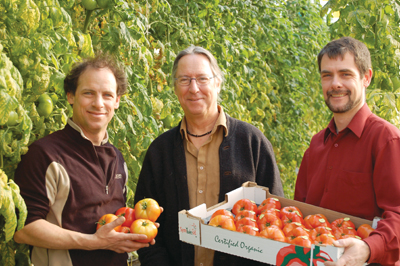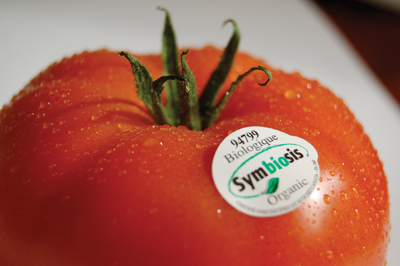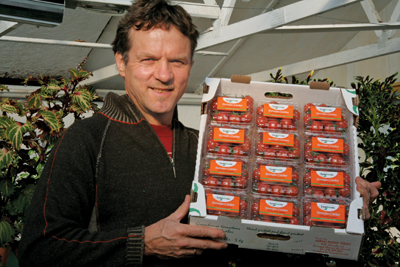
They are seven growers, located far apart on Québec’s agricultural map. Every week, their produce finds its way – all on the same order – into the organic department of supermarkets belonging to just about every major chain in Ontario and Québec.

|
| Serres Jardins-Nature shareholders François Bouchard, Christian Côté and Germain Babin. (PHOTO COURTESY SERRES JARDINS-NATURE)
|
They are seven growers, located far apart on Québec’s agricultural map. Every week, their produce finds its way – all on the same order – into the organic department of supermarkets belonging to just about every major chain in Ontario and Québec.
Les Producteurs biologiques Symbiosis have now been together for 10 years. As other produce growers kept struggling to come up with provincial joint marketing plans, this group stood out and found its own way into supermarkets.
Ten years down the road, the Symbiosis model remains a unique way to provide growers with steady orders at prices that reflect their products’ quality.
Symbiosis members – most of them pioneers of greenhouse organics – have demonstrated that Canadian-grown organics can very well meet the quality and quantity standards of large food store chains.

|
|
| A Symbiosis tomato |
|

|
|
| Grower Serge Lessard runs an organic greenhouse operation in Saint-Joseph-de-Beauce. He is vice-president of Les Producteurs biologiques Symbiosis.(PHOTOS COURTESY ANDRÉ DUMONT)
|
A SIMPLE AND CENTRALIZED MARKETING CONCEPT
The concept is simple. Farmers fax their product availability list to sales coordinator Denis Fiset, the group’s only employee. At his Saint-André-d’Argenteuil (near Mirabel) home office, Fiset puts together a price list and e-mails it to clients. He then picks up the phone, convinced that his products are the best.
“Selling all this produce is not a problem,” Fiset says. “The question is, at what price? That’s where my talent comes into play.”
Symbiosis members sell more than half of their production in Ontario, and usually at higher prices than what growers from that province are paid, Fiset says.
Growing demand for local products is making Fiset’s job easier. Canadian consumers are getting more and more skeptical about the environmental value of organic produce trucked all the way from California.
When an order comes in, Fiset splits it among his producers. Carrots may come from Jardins Bio-Forestiers, in the northern Lac-Saint-Jean region. Tomatoes may be shipped from Serres Jardins-Nature, in far away Gaspésie, and cucumbers from Ferme Pleine Terre, south of Québec City.
FORTY DIFFERENT VEGETABLES, SOME AVAILABLE YEAR ROUND
Each grower is responsible to deliver his produce to the buyer’s warehouse or distribution centre. All products have previously been tagged with a Symbiosis sticker, or packed using Symbiosis boxes or bags. All packaging formats match the group’s product list, which includes some 40 different vegetables, some of them available year round.
Symbiosis is both a brand and a “voluntary sales agency,” says Germain Babin, agronomist and sales director at Serres Jardins-Nature, a facility that also produces President’s Choice organic tomatoes.
On one hand, Symbiosis members agree not to solicit the group’s clients. On the other, they remain free to pursue any other form of marketing, be it at the farmgate, at farmers’ markets or in local food stores.
Symbiosis limits its own client list to major supermarket chains and selected organic produce distributors.
‘OUR GROUP IS VERY MUCH FOCUSED ON QUALITY’
Despite labelling, the Symbiosis brand has yet to gain significant awareness among consumers. But for volume buyers, the reputation is well established. “Our group is very much focused on quality,” Babin says. “Buyers know we won’t cut our prices.”
Babin knows what to say to buyers tempted by lower-price merchandise from the U.S. “You won’t get the same quality and it won’t be a local product.”
Produce marketing remains a tough game, even in organics, Babin admits. At the height of tomato season, when markets are flooded with local produce, Babin still has to find buyers for his top quality tomatoes.
There is competition from the U.S., but also from local growers enjoying individual business relationships with supermarket chains. The difference is that with Symbiosis, the buyer has access to a wide variety of organic vegetables on a single order. He also knows the quality will be constant and volumes large enough to be distributed in all his stores.
“To cater to large chains, you need volume, quality and steady supply over the longest possible period of the year,” Fiset explains.
WORKING WITH OTHER ORGANIC PRODUCERS
The Symbiosis model also has its limits. A member will not drive five hours to deliver only 15 bags of beets to complete a larger order. When the quantity ordered for a specific vegetable is too small, Fiset calls upon an organic produce distributor and offers his client a rebate for accepting a non-Symbiosis product.
Using a common warehouse and delivery network could solve some of Symbiosis’ challenges, but such fixed costs are beyond the group’s means.
No budget has yet been allocated for advertising. “Our whole structure is set up for us to be able to sell at the best price, in order for our products to be accessible to the greatest number of consumers,” says grower Serge Lessard, of Ferme Pleine Terre.
Les Producteurs biologiques Symbiosis will soon have their own website, to inform the public about the quality of their produce. One of Québec’s organic farming’s best kept secret will then be revealed to consumers, who ask no better than to know exactly what’s in the food they eat.
André Dumont is a freelance writer and photographer in Montreal.
Print this page